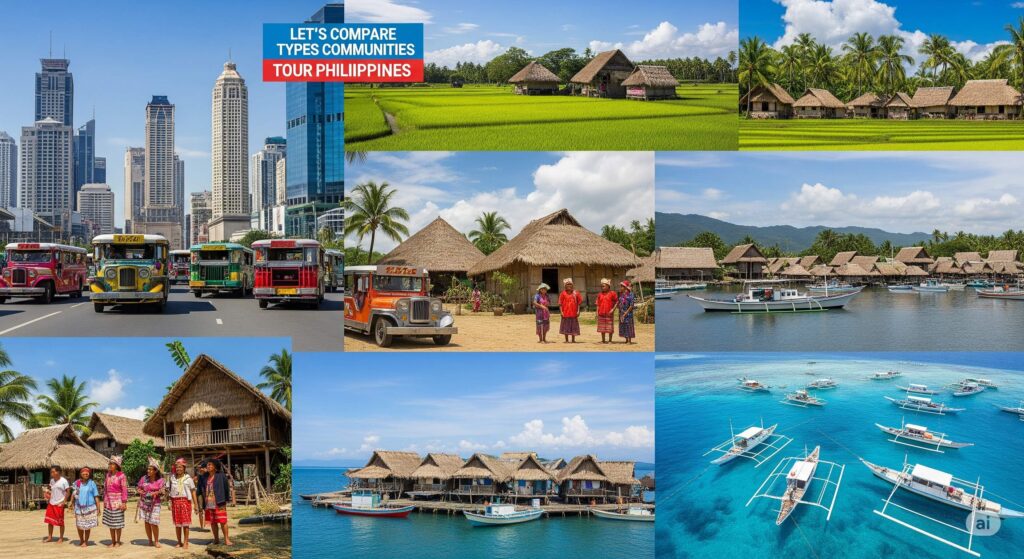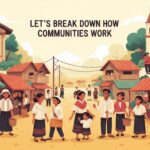Hey there, curious learner! Let’s dive into the wild world of communities and their “personalities.” Think of communities like ice cream flavors—each has unique ingredients, but they’re all delicious! Ready to taste-test?
Step 1: Icebreaker – What’s Your Flavor?
🍦 Quick Poll:
If communities were ice cream, which flavor are you today?
- Vanilla (classic and structured)
- Chunky Monkey (messy but fun)
- Matcha (unique and intentional)
- Rainbow Sherbet (colorful and diverse)
Step 2: Typology 1 – Formal vs. Informal Communities
<Formal Communities>
- Definition : Official groups with rules, hierarchies, and goals.
- Examples : Schools, governments, corporations.
- Vibe : Like a chess club with a president, treasurer, and bylaws.
<Informal Communities>
- Definition : Loose, spontaneous groups based on shared interests.
- Examples : A group chat for dog lovers, neighbors who BBQ every weekend.
- Vibe : Like a pickup basketball game—no rules, just fun!
🎮 Activity: “Guess the Type”
Is this formal or informal?
- A city council meeting. (Formal!)
- Friends binge-watching Netflix. (Informal!)
Step 3: Typology 2 – Rural vs. Urban Communities
<Rural Communities>
- Definition : Small, close-knit groups in countryside areas.
- Traits : Everyone knows everyone, traditions run deep, jobs often tied to farming or crafts.
- Example : A village where the annual harvest festival is the biggest event.
<Urban Communities>
- Definition : Large, diverse groups in cities.
- Traits : Fast-paced, anonymous, lots of services (subways, hospitals).
- Example : A bustling neighborhood with food trucks, artists, and tech workers.
🗺️ Compare & Contrast:
| Rural | Urban |
| Tight relationships | Casual acquaintances |
| Slower pace | 24/7 hustle |
| Nature-focused | Tech and trends |
Step 4: Typology 3 – Virtual vs. Physical Communities
<Virtual Communities>
- Definition : Online groups connected by shared interests.
- Examples : Reddit forums, gaming guilds, Instagram fan pages.
- Pros : Global reach, 24/7 access.
- Cons : Hard to build deep trust.
<Physical Communities>
- Definition : In-person groups tied to a location.
- Examples : A yoga studio, a church group, a farmers’ market.
- Pros : Face-to-face bonding, hugs allowed!
📱 Debate:
Which is better for making friends: a TikTok dance challenge or a pottery class?
Step 5: Typology 4 – Intentional vs. Accidental Communities
<Intentional Communities>
- Definition : Groups formed on purpose to achieve a goal.
- Examples : Eco-villages, activist collectives, co-op housing.
- Vibe : “We’re here to change the world!”
<Accidental Communities>
- Definition : Groups formed by chance due to location or circumstance.
- Examples : Apartment building neighbors, coworkers in the same office.
- Vibe : “We’re stuck together… might as well get along!”
💡 Reflect:
Have you ever joined an intentional community? What about an accidental one?
Step 6: Wildcard – Identity-Based Communities
<Cultural/Ethnic Communities>
- United by heritage (e.g., a Chinatown neighborhood).
<Interest-Based Communities>
- United by hobbies (e.g., a skateboarding crew).
<Faith-Based Communities>
- United by religion (e.g., a mosque or temple group).
🎨 Activity: “Mix & Match”
Can a community be both rural AND faith-based?
(Yes! Think of a small Amish community.)
Step 7: Why Does This Matter?
🌍 Real-World Impact:
- Social Workers : Need to tailor programs to rural vs. urban needs.
- Marketers : Use different strategies for formal vs. informal groups.
- You : Understanding communities helps you find your tribe!
Step 8: Your Mission
🚀 Take Action:
- Today : Identify one community you’re part of. Is it formal, rural, virtual, etc.?
- This Week : Join a new community (even a virtual one, like a Discord server!).
💬 Final Thought:
“Communities are like constellations—each star shines brighter when connected.”
You’re now a community-typology guru! Go explore the world’s many flavors. Questions? I’m here! 😊


